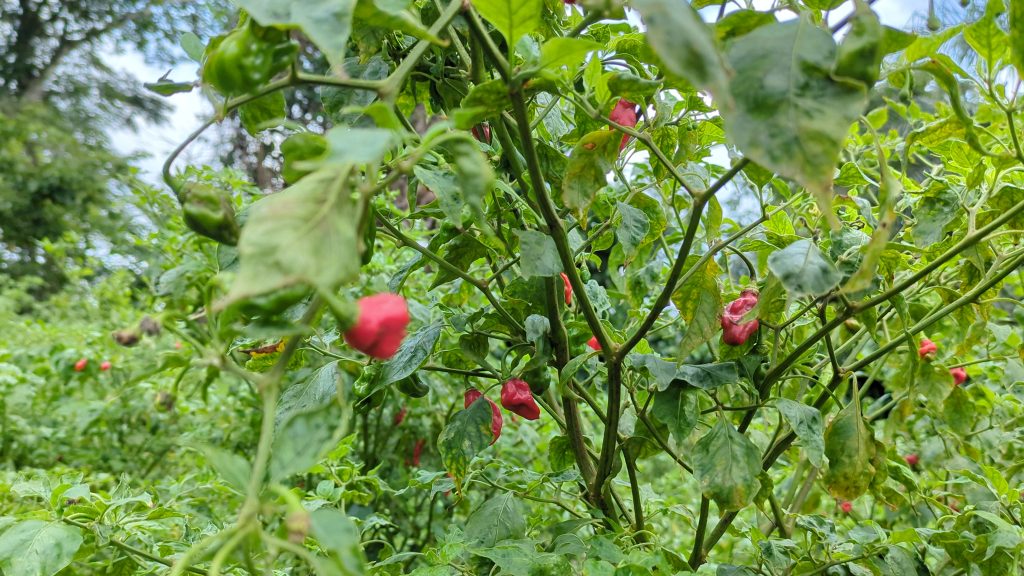By: Joseph Titus Yekeryan
In a quiet corner of rural Liberia, a young man is sowing the seeds of a brighter agricultural future — one pepper plant at a time.
Joseph Brownell, a determined and enterprising farmer in his 30s, is making notable strides in the country’s agricultural landscape. Without donor funding or government support, Brownell took a bold leap three months ago by cultivating approximately four acres of land with pepper, a staple crop in Liberian cuisine.
Now, with his peppers ripe and ready for harvest, the fruits of Brownell’s labor are beginning to pay off. The yield is expected to be substantial, with several bags of fresh, locally grown peppers anticipated. But Brownell is not stopping there.
While managing the current harvest, he is simultaneously expanding his efforts; cultivating a larger plot of land in preparation for a new crop cycle. Bitter balls and additional pepper plants are already in the nursery, marking his next step toward contributing to food security in Liberia.

“I went back to the soil because I believe Liberia can feed itself,” Brownell said in an interview. “We don’t need to import everything we eat. If we invest in our land and support young farmers, we can feed our people.”
Brownell’s story stands out in a nation where agriculture holds the promise of economic transformation but often lacks the necessary investment. The young farmer’s initiative aligns with broader efforts to reduce Liberia’s reliance on food imports and encourage youth involvement in agribusiness.
Recent reports highlight the urgency of addressing food insecurity in West Africa. The United Nations World Food Program (WFP) revealed that over 40 million people in West and Central Africa are currently struggling to secure enough food, with projections indicating the number could rise to 52 million by mid-next year. Source: https://www.wfp.org/news/west-and-central-africa-faces-deepening-food-crisis-un-agencies-call-enhanced-humanitarian
Key drivers of this food insecurity include conflict, displacement, economic instability, and severe climate shocks.
In response to global challenges, the World Bank has announced plans to double its annual investment in agricultural financing and businesses to $9 billion by 2030. World Bank President Ajay Banga emphasized the need to address challenges such as food production, productivity, water scarcity, fertilizers, infrastructure, and financing.
Source: https://www.worldbank.org/en/news/press-release/2024/10/23/world-bank-group-announces-strategic-pivot-in-agribusiness-doubles-financial-commitment
These developments underscore the critical importance of agriculture in ensuring food security and economic stability. However, despite global commitments, many local farmers like Brownell continue to face significant challenges due to limited access to resources and support.
Brownell acknowledges these challenges but remains optimistic. “If I can achieve this on my own, imagine what I could do with a little help,” he said. “With support from the government or NGOs, I could supply the Liberian market with fresh pepper all year round.”
Liberia is a signatory to several international agreements aimed at promoting agricultural development and food security. The International Treaty on Plant Genetic Resources for Food and Agriculture, for instance, seeks to ensure that plant genetic resources essential for food security are accessible to all farmers and in the public domain.
Regionally, Liberia is a member of the Economic Community of West African States (ECOWAS), an organization established to foster economic integration and development among West African countries. ECOWAS aims to achieve “collective self-sufficiency” by creating a single large trade bloc and promoting a full economic and trading union.
Additionally, the African Continental Free Trade Area (AfCFTA) agreement, which Liberia has ratified, aims to create a single, liberalized market, reduce barriers to capital and labor to facilitate investment and establish a continental customs union. The agreement is expected to increase socioeconomic development, reduce poverty, and make Africa more competitive in the global economy.
While these treaties and agreements provide a framework for agricultural development, Experts say their effective implementation at the national level varies. They say the success of such initiatives often depends on factors like political will, infrastructure development, and the active involvement of local communities.
For now, Brownell continues his daily work in the fields, fueled by vision, grit, and a commitment to Liberia’s food future. His story serves as a quiet yet powerful reminder of the potential that lies within the nation’s soil and its youths.



